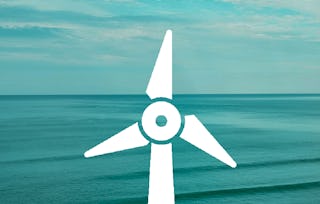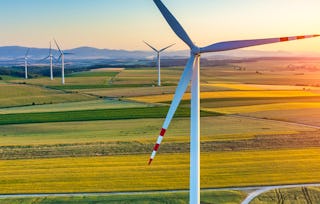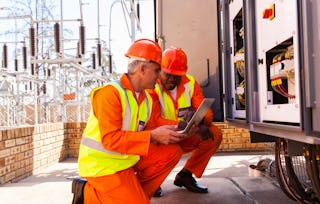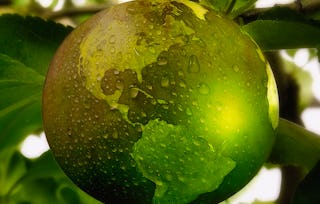This course is designed to introduce students to the issues of energy in the 21st century – including food and fuels – which are inseparably linked – and will discuss energy production and utilization from the biology, engineering, economics, climate science, and social science perspectives.

Gain next-level skills with Coursera Plus for $199 (regularly $399). Save now.

(1,175 reviews)
Skills you'll gain
Details to know

Add to your LinkedIn profile
See how employees at top companies are mastering in-demand skills

There are 10 modules in this course
Course overview materials, including syllabus, lecturer information, grading criteria, and external notices and resources.
What's included
7 readings
Introduces the basics of energy, covers finite energy sources like petroleum, looks at how energy and food are related, and examines the scale of current and future energy consumption and what renewable energy options can meet that demand.
What's included
10 videos5 readings1 assignment
Looks at some of the alternative energy options from the physical sciences domain, including wind energy, photovoltaic and photothermal energy, and nuclear energy. It also covers energy storage and electric vehicles, and energy efficiency and smart grid technologies.
What's included
12 videos6 readings1 assignment1 peer review
Provides an overview of the different biological energy sources including plants and algae. It explains what biofuels are, how they are produced, and the pros and cons of different biological sources.
What's included
2 videos1 reading
Discusses various plant-based fuels including corn ethanol, cellulosic ethanol, and jatropha biodiesel. It will cover the different technologies used, the pros and cons of each source, and current production around the world.
What's included
6 videos3 readings1 assignment
Examines different algae used for biofuel production including cyanobacteria, diatoms, and green algae. It looks at how these organisms are different and why they are used to produce biofuels and bio-products. Additionally, the module covers the different tools and technologies used in research and production including bio-prospecting, genetics, synthetic biology, and metabolic engineering.
What's included
9 videos5 readings1 assignment
Covers the chemistry of biodiesel, looks at the different thermochemical processes used to convert biomass to fuel, and examines renewable biogas. It also looks at the production process of algae biofuel, how and why nutrient utilization and recycling is important in biofuel production, and the relationship between biofuel and water.
What's included
11 videos6 readings1 assignment
Examines how energy production and use affects the economy, our wellbeing, and our heath. It will also look at how energy impacts the poorest communities, the external costs of traditional energy, and how we can regulate energy and incentivize renewable energy. Additionally, this section identifies what a Life Cyle Assessment is and how it is used with renewable and non-renewable fuels. Lastly, it looks at the United States’ past and present energy policies, and the current state of international policy on climate change.
What's included
16 videos7 readings1 assignment1 peer review
Looks at the history of research on how carbon dioxide causes climate change, the key points of the Intergovernmental Panel on Climate Change’s reporting, and how climate change is portrayed in the media. Also, it discusses the importance of decreasing Short-lived Climate Pollutants (SLCPs) to mitigate climate change and some possible solutions to reduce these pollutants produced by the poorest communities. Additionally, this section looks at how climate change has affected California’s water and energy use, and how climate change threatens global food security.
What's included
8 videos4 readings1 assignment
Recordings of live office hours from Dr. Mayfield and other course lecturers.
What's included
10 videos
Instructor

Offered by
Explore more from Environmental Science and Sustainability
 Status: Free Trial
Status: Free TrialUniversity of Colorado Boulder
 Status: Preview
Status: PreviewUniversity of Alberta
 Status: Free Trial
Status: Free TrialUniversity at Buffalo
 Status: Free Trial
Status: Free TrialStanford University
Why people choose Coursera for their career




Learner reviews
1,175 reviews
- 5 stars
79.98%
- 4 stars
16.35%
- 3 stars
2.29%
- 2 stars
0.34%
- 1 star
1.02%
Showing 3 of 1175
Reviewed on Apr 24, 2016
An excellent course for environmentally conscious individuals interested in the different options we have to create a 100% renewable energy future.
Reviewed on Jun 23, 2021
very knowledgeable course , you can understand various techniques of conservation of energy sources and safe earth from big issues like global warming etc .
Reviewed on Jul 19, 2020
It was a very good course. A lot of topics very important to understand and know about energy, renewables and others issues related to this topic. Thanks

Open new doors with Coursera Plus
Unlimited access to 10,000+ world-class courses, hands-on projects, and job-ready certificate programs - all included in your subscription
Advance your career with an online degree
Earn a degree from world-class universities - 100% online
Join over 3,400 global companies that choose Coursera for Business
Upskill your employees to excel in the digital economy
Frequently asked questions
To access the course materials, assignments and to earn a Certificate, you will need to purchase the Certificate experience when you enroll in a course. You can try a Free Trial instead, or apply for Financial Aid. The course may offer 'Full Course, No Certificate' instead. This option lets you see all course materials, submit required assessments, and get a final grade. This also means that you will not be able to purchase a Certificate experience.
When you purchase a Certificate you get access to all course materials, including graded assignments. Upon completing the course, your electronic Certificate will be added to your Accomplishments page - from there, you can print your Certificate or add it to your LinkedIn profile.
Yes. In select learning programs, you can apply for financial aid or a scholarship if you can’t afford the enrollment fee. If fin aid or scholarship is available for your learning program selection, you’ll find a link to apply on the description page.
More questions
Financial aid available,
¹ Some assignments in this course are AI-graded. For these assignments, your data will be used in accordance with Coursera's Privacy Notice.

